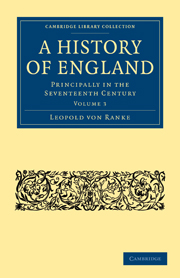Book contents
- Frontmatter
- Contents
- BOOK XI THE COMMONWEALTH IN ENGLAND, 1649—1653
- BOOK XII THE PROTECTORATE OF OLIVER CROMWELL, 1653–1658
- BOOK XIII FALL OF THE PROTECTORATE AND THE COMMONWEALTH. RESTORATION OF THE MONARCHY, 1658—1660
- INTRODUCTION
- CHAP. I Attempt to continue the Protectorate
- CHAP. II Attempt to form a Commonwealth on a new basis
- CHAP. III Royalist movements in the summer of 1659
- CHAP. IV Supremacy and constitutional projects of the Army
- CHAP. V Lambert and Monk. Restoration of the Rump Parliament
- CHAP. VI Anti-republican movement. Monk in the City
- CHAP. VII Recall of the King
- BOOK XIV THE FIRST FIVE YEARS UNDER CHARLES II. THE RESTORATION OF THE ANGLICAN CHURCH
- BOOK XV THE DUTCH WARS OF CHARLES II. ESTABLISHMENT OF THE PROTESTANT AND PARLIAMENTARY CHARACTER OF THE CONSTITUTION 1664—1674
- Frontmatter
- Contents
- BOOK XI THE COMMONWEALTH IN ENGLAND, 1649—1653
- BOOK XII THE PROTECTORATE OF OLIVER CROMWELL, 1653–1658
- BOOK XIII FALL OF THE PROTECTORATE AND THE COMMONWEALTH. RESTORATION OF THE MONARCHY, 1658—1660
- INTRODUCTION
- CHAP. I Attempt to continue the Protectorate
- CHAP. II Attempt to form a Commonwealth on a new basis
- CHAP. III Royalist movements in the summer of 1659
- CHAP. IV Supremacy and constitutional projects of the Army
- CHAP. V Lambert and Monk. Restoration of the Rump Parliament
- CHAP. VI Anti-republican movement. Monk in the City
- CHAP. VII Recall of the King
- BOOK XIV THE FIRST FIVE YEARS UNDER CHARLES II. THE RESTORATION OF THE ANGLICAN CHURCH
- BOOK XV THE DUTCH WARS OF CHARLES II. ESTABLISHMENT OF THE PROTESTANT AND PARLIAMENTARY CHARACTER OF THE CONSTITUTION 1664—1674
Summary
There had been a time in England when the crown had been as powerful, the hierarchy as firmly established, as in any of the Western kingdoms. The nobility and the towns, united with Church and King in Parliament, formed a constitution of lasting and, so long as they were of one mind, of vigorous vitality. In such constitutions there can be no lack of disputes. Again and again in England were they actually fought out with the sword, yet the Commonwealth remained essentially intact. It was otherwise in the struggles which broke out towards the middle of the seventeenth century, in which all Britain was involved. In the course of these, under the influence of religious, political and military impulses, deeplying forces manifested themselves which broke the power of the monarchy and the aristocracy, and strove to replace them by a republic, though of a kind hitherto unknown.
It is true that elsewhere in the manifold currents of European political life, republican institutions had now and then appeared,—notably within the limits of the old German empire, on both sides of the Alps, in Upper and finally in Lower Germany. It was still fresh in men's memories how the Republic of the United Netherlands had been founded and successfully upheld. But these free states were all rather detached territories than complete nationalities, and were of moderate extent, enjoying only an imperfect political independence, and internally aristocratic and conservative. Fundamentally different in character was the new English Commonwealth.
- Type
- Chapter
- Information
- A History of EnglandPrincipally in the Seventeenth Century, pp. 219 - 221Publisher: Cambridge University PressPrint publication year: 2010First published in: 1875

